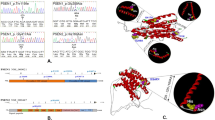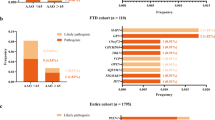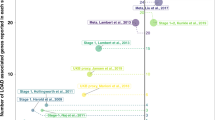Abstract
The Indiana kindred variant of Gerstmann-Sträussler-Scheinker disease has amyloid plaques that contain prion protein (PrP), but is atypical because neurofibrillary tangles like those of Alzheimer disease are present. To map the position of the disease causing gene, we used three markers for linkage analyses. A missense mutation at codon 198 of the PrP gene (PRNP) is found in all definitely affected individuals and yields a maximum lod score of 6.37 (Θ= 0). The disease also is concordant with the two other PRNP-region markers. These results demonstrate tight linkage of the disease-causing gene to PRNP and support the hypothesis that the codon 198 mutation is the cause of IK-GSS. Our studies also suggest that methionine/valine heterozygotes at PRNP codon 129 have a later age of onset of the disease than codon 129 valine/valine homozygotes.
This is a preview of subscription content, access via your institution
Access options
Subscribe to this journal
Receive 12 print issues and online access
$209.00 per year
only $17.42 per issue
Buy this article
- Purchase on Springer Link
- Instant access to full article PDF
Prices may be subject to local taxes which are calculated during checkout
Similar content being viewed by others
References
Azzarelli, B. et al. Acta Neuropathol. 65, 235–246 (1985).
Farlow, M.R. et al. Neurology 39, 1446–1452 (1989).
Ghetti, B. et al. Neurology 39, 1453–1461 (1989).
Farlow, M.R. et al. Neurology 41(Suppl), 119 (1991).
Hsiao, K. et al. 11(3), 302 (1990).
Hsiao, K. et al. 68–71 (1992).
Hsiao, K. et al. Nature 338, 342–345 (1989).
Goldgaber, D. et al. Exp. Neurol. 106, 204–206 (1989).
Doh-ura, K. et al. Biochem. biophys. Res. Commun. 163, 974–979 (1989).
Speer, M.C. et al. Genomics 9, 366–368 (1991).
Puckett, C., Concanon, P., Casey, C. & Crow, T. J. Am. J. hum. Genet. 49, 320–329 (1991).
Wu, Y. et al. Nuc. Acids Res. 15, 3191 (1987).
Owen, F., Poulter, M., Collinge, J. & Crow, T.J. Nuc. Acids Res. 18, 3103 (1990).
Medori, R., et. New Engl. J. Med. 326, 444–449 (1992).
Prusiner, S.B. et al. Cell 63, 673–686 (1990).
Palmer, M.S., Dryden, A.J., Hughes, J.T. & Collinge, J. Nature 352, 340–342 (1991).
Baker, H.F. et al. Lancet 337, 1286 (1991).
Tagliavini, F. et al. EMBO J. 10, 513–519 (1991).
Lange, K., Weeks, D.E. & Boehnke, M. Genet. Epidem. 5, 471–472 (1988).
Conneally, P.M. et al. Cytogenet. Cell Genet. 40, 356–359 (1985).
Author information
Authors and Affiliations
Rights and permissions
About this article
Cite this article
Dlouhy, S., Hsiao, K., Farlow, M. et al. Linkage of the Indiana kindred of Gerstmann-Sträussler-Scheinker disease to the prion protein gene. Nat Genet 1, 64–67 (1992). https://doi.org/10.1038/ng0492-64
Received:
Accepted:
Issue Date:
DOI: https://doi.org/10.1038/ng0492-64
This article is cited by
-
Shortening heparan sulfate chains prolongs survival and reduces parenchymal plaques in prion disease caused by mobile, ADAM10-cleaved prions
Acta Neuropathologica (2020)
-
Detection of tau in Gerstmann-Sträussler-Scheinker disease (PRNP F198S) by [18F]Flortaucipir PET
Acta Neuropathologica Communications (2018)
-
Gerstmann-Sträussler-Scheinker disease subtypes efficiently transmit in bank voles as genuine prion diseases
Scientific Reports (2016)
-
National Institute on Aging–Alzheimer’s Association guidelines for the neuropathologic assessment of Alzheimer’s disease: a practical approach
Acta Neuropathologica (2012)



